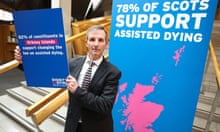More than 90% of the UK’s population believe assisted dying should be legalised for those suffering from terminal illnesses, according to an opinion poll that shows growing support for change to the law.
A survey carried out by the campaign group My Death, My Decision (MDMD) also found that 88% of respondents considered it acceptable for dementia sufferers to receive help to end their lives, provided they consented before losing their mental capacity.
The results have been released as the Royal College of Physicians polls its members this month on whether they back a change to the ban on the right to die. The Channel Island of Jersey has launched a review on whether to introduce assisted dying legislation.
The MDMD poll was conducted by the National Centre for Social Research (NatCen) and involved 2,500 respondents. A previous survey carried out by Dignity in Dying in 2015 found that 82% of people supported assisted dying.
Providing medical assistance to end a life is legal in Belgium, Canada, Colombia, Holland, Luxembourg, Switzerland and seven US states. The UK Assisted Dying Coalition has collected figures showing that more than one person a week now travel from Britain to Switzerland to end their life.
The two most recent legal challenges to the UK ban have been dismissed by the courts, which ruled that it was up to parliament to decide on the issue. Last November, the supreme court turned down an application to hear a claim from lawyers for Noel Conway, a retired lecturer who is paralysed from the neck down by progressive motor neurone disease.
The previous month, a father of three, identified only as Omid T, who was suffering from a severe neuro-degenerative condition, had travelled to a Swiss clinic to end his life. Five days after he died, the high court ruled against his legal challenge.
Helping someone kill themselves is a criminal offence that carries a maximum sentence of 14 years and is prohibited by section 2(1) of the Suicide Act 1961. Euthanasia is considered murder under UK law.
The MDMD survey asked respondents whether it would be correct to allow assisted suicide in a number of circumstances. It found that 93% of the public would consider medical help acceptable in some situations, including when the person is suffering from an incurable illness that will eventually cause their death.
The organisation’s chief executive, Dave Osmond, said: “These results show that the gulf between our politicians and the public is widening, as assisted dying becomes increasingly acceptable. Time and time again we have told our decision-makers that the right to choose the manner and timing of your own death is a fundamental human right. Yet, time and time again, their inaction has let down families like my own.
“I will never forget the courage of my mother-in-law when she asked me to help her go to Switzerland. Nor the agony I and my entire family went through, by having to choose between helping her, and risking imprisonment, or not and watching her continue to suffer.”
Osmond was questioned by murder squad detectives after accompanying his terminally ill mother-in-law to the Swiss clinic. “It was a traumatic experience,” he said. “Each case has to go before the director of public prosecutions. Eventually, they decided no further action should be taken.”
Alex Pandolfo, a supporter of MDMD who suffers from Alzheimer’s and who expects to travel to Switzerland to end his life, said: “Dementia is a cruel disease, and has slowly robbed my life of its quality. Even the basic things, such as planning to see friends, reading, or going outside alone, have become impossible now. In place of the freedom and independence I used to enjoy, my life has now become full of fear.
“If I waited until I had six months left, not only would I no longer have capacity to make that decision, I’d be forced to live, for potentially years, as the very antithesis of the person I am now.”
Parliament last voted on assisted dying in 2015, rejecting by 330 against to 118 a private member’s bill to legalise assistance for those who were terminally ill and likely to die within six months.
Unlike some other right to die organisations, MDMD does not believe assisted suicide should be restricted to only those who are terminally ill with a prognosis of six months or less.
The campaign group Care Not Killing opposes the right to die and argues that the law should not be changed. Responding to the supreme court’s ruling on Conway last autumn, it said: “The judges, parliamentarians, doctors and disability rights groups are all in agreement – that the safest law is the one we currently have. It carefully balances an individual’s rights with the need to protect vulnerable people, who could feel pressured into ending their lives.”









